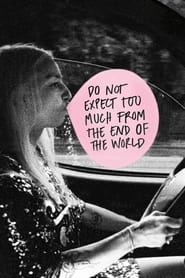A bone-dry black comedy on both the current state of the world and the perfidy of video imagery, and a film about cultural exhaustion that isn't itself exhausting... and just right side of being Goddardian agitprop. The particular kind of ugly monochrome used for the film's depiction of the 'real' world is not merely unpleasant on the eye; it seems to be chromatically metaphorical of the washed-out, binary character of modern life that's somehow both enervated and hyper-caffeinated at the same time... and this is despite it being the only part of the movie captured on physical 16mm film.
Much of what is written about this movie so far appears to be uncritical if not entirely supportive of Angela's TikTok parodies, reading them as some combination of cathartic self-care and politically empowering takedowns of the misogynistic rhetoric and lifestyle of Andrew Tate et al. The obvious surface validity of the arguments against Tate (and their subtle references) aside, Angela's videos seem limited in scope as a form of political action and perhaps even reflect a nihilistic callow view of satire that might even foreshorten, rather than fuel, change.
Anyway, Nina Hoss' character is a savage take-down of smug Western liberalism.
The archival footage becomes integrated into the film’s diegesis, rather than serving a purely discursive function. But that would be a bit too simplistic in a film that so aggressively interrogates the distinction between documentary and fiction—or, to put it more directly, the deceptive potential of recorded images.
— Seth Katz (Slant Magazine)
I really believe [that] the more education you have about images, the more you can understand and see them in better ways. I’m always amazed that if you [make] someone listen to classical music, they won’t say immediately, “Okay, I got it, I understand, okay,” but if I show someone our Zoom talk, in one second, people will say, “Oh, I really understood everything. It’s all there in the image. The image is offering itself to us 100%.” But I believe this is just an illusion. I think that images—the world of images, the creation of images, the consumption of images—are very complicated. It’s difficult to really understand them properly, even if you’re interested in and educated in [them].
— Director Radu Jude (Slant Magazine)
The first movie I’ve seen in a long time [that] feels the way contemporary life feels, not just its superficial texture but its essence. It captures what it’s like to live in this chaotic and deadening world so well it might be the movie of the year, and last year, and next year too. If a visitor from the future wanted to know what it was like to be alive right now, this is what I’d show them.
— Sam Adams (Slate)
Angela isn’t just venting; Bobiţă seems to open a vital creative spigot in her. The posts are a remarkably sustained brand of satirical performance art, and they testify to a restless talent for writing, acting, and filmmaking that her colleagues at the film company are doing nothing to develop. It’s telling that, for all Angela’s physical fatigue, [she] springs immediately into action whenever a fresh burst of Bobiţă inspiration hits. No matter how gruelling her day job, her mental and artistic energies, and indeed the entirety of her voracious mind, are still woefully underemployed.[…]
Angela stays with you, and much of what sustains Do Not Expect Too Much from the End of the World, making it an eccentric delight as well as an epic downer, is the unforced warmth, transparent decency, and blowsy good humor of Angela’s company. Witness the bawdy jokes she cracks, instinctively and relentlessly, with the friendly strangers that she meets. Watch as she gives money to a homeless woman, then scolds the restaurant worker who tries to shoo the woman away. Loveliest of all is the sense of kinship that ignites when she runs into the other Angela, now elderly and still played by Dorina Lazăr—a character magically transplanted, by the power of cinema, from one fictive universe into another. Their shared intimacy lasts only moments, but something ineffable and precious happens between them, a wordless sense of cross-generational recognition and solidarity. Jude may not hold out much hope for the end of the world, but the work of art he’s made is firmly on the side of the Angelas.
— Justin Chang (The New Yorker)
I’m happy to let my scenes stretch a second longer than they should, because often the humor I’m after lies in those moments.
— Director Radu Jude (Filmmaker Magazine)
The anti-Frances Ha, a vulgar blast of contemporary political outrage and anger shot into the miasma of contemporary image production.
— A. S. Hamrah (n+1 magazine)

